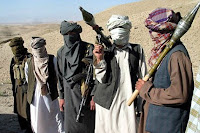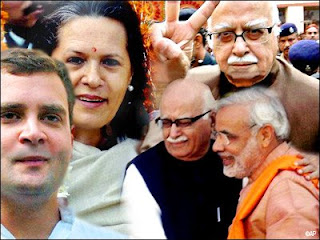by Vaidehi Sachin
MALEGAON ACCUSED COL PUROHIT GETS BAIL
In a major setback to the Anti-Terrorism Squad (ATS), Lt Col Prasad Purohit, the prime suspect of Malegaon blasts case, was granted bail in a fake arm license case by a magistrate court in Pune. The court granted bail to him after the ATS failed to file a chargesheet within the stipulated 90 days period. Judicial magistrate first class G.G. Itkalkar ordered Purohit's release on Rs 15,000 security bonds. Purohit was booked for allegedly procuring a rifle and a fake gun licence for Milind Date, a resident of Erandwane. Purohit allegedly accepted Rs 35,000 from Date. The ATS had seized the fake licence and rifle from Date on November 4, after which Date had lodged a complaint against Purohit, accusing the officer of cheating and forgery. The magistrate also issued a notice to the ATS seeking an explanation from the investigation officer why the chargesheet was not submitted in time. Purohit, who has been booked under MCOCA in the Malegaon blast case, continues to be in judicial custody in Mumbai because he is facing trial in three blast cases, at Malegaon, Jalna and Nanded, besides two other fake arms licence cases at Nasik and Mumbai.
MILITANTS HURLS A GRENADE NEAR CHILDREN'S PARK, NONE INJURED
Some suspected militants hurled a hand grenade near Childrens' Park near Bakshi Stadium in the city but no loss of life, however, was reported, a police spokesman said today. "Some unknown militants lobbed a grenade near Children Park which exploded on road side last night," the spokesman said, adding however, no loss of life or injury was reported in the incident. Police has registered a case in this regard and investigations are going, he said.
MAOISTS OBSERVE JHARKHAND, ORISSA AND BENGAL BANDH
The security forces are maintaining tight vigil at railway stations and on railway tracks as the 24-hour bandh called by CPI (Maoist) in Jharkhand, Orissa and West Bengal began early today. The bandh has been called in protest against the arrest of Maoist cadre, according to posters spotted in their strongholds. A report from Hazaribagh said, a group of Maoists obstructed laying of new rail tracks at Katkamsahi and allegedly took away machinery from the site last night. Long distance bus operators have pulled out their vehicles in Gumla, Latehar, Chatra, Hazaribag, Palamau and Singhbhum districts to avoid any untoward incident as several Maoist-hit pockets touch the highways. According to police sources, enough security forces have been deployed at railway stations and railway tracks. Eighteen out of 24 districts in Jharkhand are Maoist-affected.
CALIFORNIA GOVERNOR DECLARES DROUGHT EMERGENCY
California Governor Arnold Schwarzenegger declared a state emergency due to drought, requested broad conservation measures and said farm losses in the coming season could top $2 billion. Total economic losses in 2009 could be nearly $3 billion, the governor said. The move encourages urban water agencies to reduce water use by 20 percent and says mandatory conservation is an option if those and other measures prove insufficient. Schwarzenegger called the state's drought a crisis as severe as an earthquake or wildfire.
B'DESH TO CONSTITUTE SPL TRIBUNALS FOR QUICK TRIAL OF CULPRITS
Bangladesh government will constitute special tribunals for quick and "exemplary punishment of the culprits" involved in the "barbaric and gruesome" killings of army officers during the rebellion by Bangladesh Rifles (BDR) troops despite an earlier announced general amnesty. "The Prime Minister announced general amnesty does not mean that those (rebel BDR soldiers) who were involved in killings, rebellion, arson and other heinous activities will be forgiven," Prime Minister Sheikh Hasina's Principal Staff Officer (PSO) Lt Gen Mohammad Abdul Mubin said in a nationwide televised statement shortly after midnight. Mubin said the government has decided to constitute special tribunals for quick and "exemplary punishment of the culprits" for such "barbaric and gruesome activities". He promised fast track trial of "culprits" involved in the killings of army officers during the rebellion. "They (culprits) cannot be pardoned and will not be forgiven either," Mubin vowed, saying he was clarifying some issues as the PSO to the prime minister and minister in-charge of armed forces division "at her directive". His comments came as army chief General Moeen U Ahmed and senior generals held nearly two hours of meeting with Hasina as anguish visibly fumed among the army rank and file as the toll in the 33-hour mutiny rose over 67 that included BDR chief Maj Gen Shakil Ahmed who is among the dead.
BSP NAMES DEVENDRA SINGH AS ETAH CANDIDATE
BSP has named sitting Etah MP Kunwar Devendra Singh as its candidate from Etah parliamentary constituency. Singh quit the Samajwadi Party yesterday and joined the BSP. Significantly, he is the sixth sitting MP who has shifted his loyality from SP to BSP ahead of the forthcoming Lok Sabha elections. MPs, who have already joined BSP, include Shahid Siddiqui, who was elected to Rajya Sabha as SP candidate, Afzal Ansari from Ghazipur, Dhaniram Verma, Gauri Shanker, Kriti Vardhan Singh and Saif-ur-Rehman Barq. Afzal, who is brother of sitting MLA, Mukhtar Ansari, went into BSP fold after being denied ticket by the SP from Ghazipur. Mukhtar too had been named as candidate from Varanasi by BSP and will contest against BJP heavyweight Murli Manohar Joshi. Saif-ur-Rehman parted ways with the SP after Mulayam Singh's renewed bonhomie with the former BJP leader Kalyan Singh. SP sources claimed that majority of the MP, who left the party in recent times, are those who had been denied ticket for the Lok Sabha elections. Sitting MP from Gonda Kirti Vardhan Singh was the lone exception. The MP left the party despite the fact that he had already been named as a candidate by the SP.
TEN NEW MINISTERS IN RAJASTHAN CABINET EXPANSION
The two-and-a-half month old Rajasthan cabinet was expanded today with Chief Minister Ashok Gehlot inducting ten more ministers -- two of cabinet rank and eight ministers of state. Governor S K Singh administered the oath of secrecy to the new ministers at a simple swearing-in function at Raj Bhavan in the presence of Gehlot and his other cabinet colleagues, government officials and supporters of the newly anointed ministers. Dr Jitendra Singh and Rajendra Pareek were sworn-in as cabinet rank ministers while Ram Lal Jat, Bharosilal Jatav, Ashok Bairwa, Mangilal Gharasia, Pramod Jain Bhaya, Babulal Nagar, Ameen Khan and Gurmeet Kunnar were inducted as ministers of state. With this expansion, the strength of the Gehlot ministry has gone up to 23. The Chief Minister was sworn-in on December 13 last year and on December 19, he inducted 13 ministers with two of them as ministers of state. As per the norms in the house of 200, Rajasthan can have 30 ministers. Gehlot, is at present holding charge of 38 departments including some important ones such as home, finance and taxation, energy, urban development and housing, excise, mining and public works department.
NDA TO GIVE PENSION TO AGED FARMERS: ADVANI
Getting into an election mode, BJP's prime ministerial candidate L K Advani has said the NDA would launch a farm income guarantee scheme for small farmers and give pension to aged farmers if it is voted to power. "A farm income guarantee scheme would be provided to small farmers," he said addressing 'Vijay Sankalp' rally here late last evening. "If government employees can get pension, I do not see why aged farmers also should not get pension." He said the BJP would contest the Lok Sabha elections on the planks of "good governance, security for common man and development on all fronts." Accusing the UPA government of abandoning highway and rural road development and interlinking of rivers projects, he said NDA would restart all those initiatives and promote infrastructure projects so that spending of amount on these schemes will help tide over recession. Advani said during his interaction with captains of Indian industry, he was told that "worst is yet to come". "Its estimated that in the next three-four months, one-and-half crore jobs will be lost. Can the government cope with it? it cannot," he maintained.
MAOISTS BLOW UP RAILWAY STATION, TWO FEARED ABDUCTED
Maoists blew up a railway station, stormed another and are feared to have abducted two railway officials in Orissa's Sundergarh district early today just hours before the 24-hour bandh by the ultra left began in five states. About 60 Maoists, including women, struck Bhalulata railway station, 25 km from here on Howrah-Mumbai section, and triggered explosions using landmines and powerful explosives, inspector in-charge of Bisra police station C S Mohanty said. The station building was virtually razed to the ground as its roof collapsed under the impact of the explosions, Railway police said, adding nobody was injured in the attack. The station master, a gateman and a porter fled the scene and reappeared about four hours after the incident to resume duty, they said. Another railway station at Chandiposh, about 30 km from here on Rourkela-Barasuan section, was also attacked by about 50 Maoists around the same time, police said adding the ultras left after firing but the station master S K Singh and his assistant Samir Mukherjee are missing since then. The two are feared to have been abducted by the ultras and efforts are on to trace them, police said.
Chhers ........

























